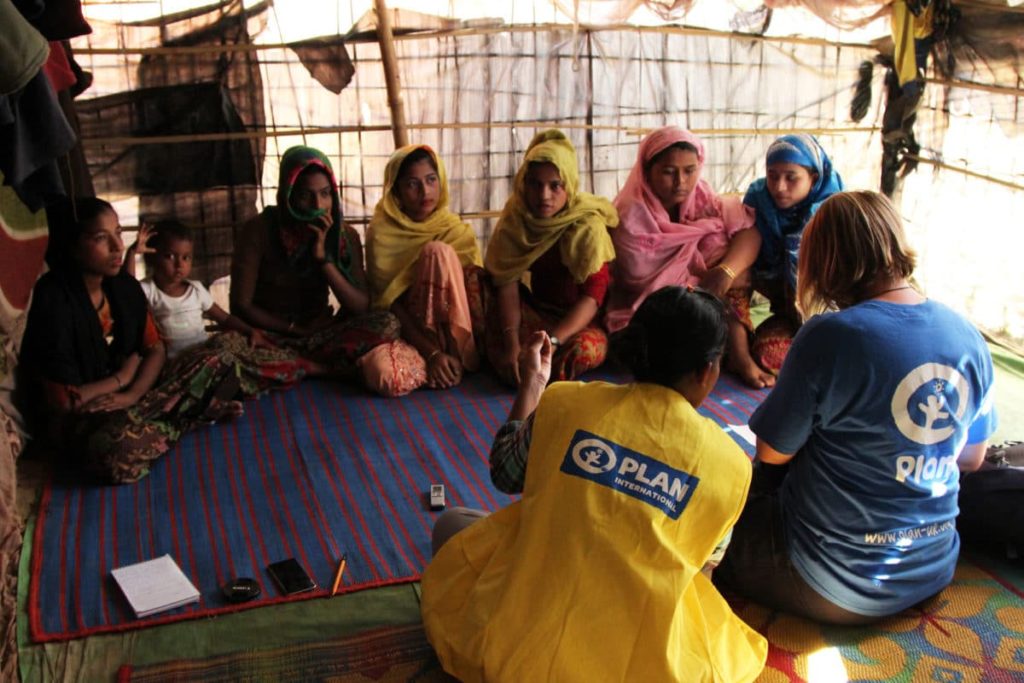Lewis Quigley, Plan International’s Information Officer reports live from Cox’s Bazar Refugee Camp, Bangladesh.
Cox’s Bazar in Bangladesh is home to nearly a million refugees, making it the biggest refugee camp in the world.
It’s been four months since I came out here to support Plan International in implementing and monitoring hygiene, child protection and education projects. Having started with Plan International as an intern in Ireland, I was motivated by the chance to make a real difference for children who have had their entire lives turned upside down. Because this crisis is a children’s crisis. 58% of Cox’s Bazar’s residents are children, not all of them with a family.
But thanks to your support, we are currently running an innovative education program to support 14,000 of these children and young people in learning, focusing the most marginalised children.
Education has far reaching benefits past educational outcomes. For the children in Cox’s Bazar, going to school provides them with emotional support in dealing with trauma, and importantly, it’s a chance to build new friendships. Plan International has opened 40 shared learning centres and an additional 700 learning sites for children to grow and learn. Last week, on a visit to one of the learning centres, I witnessed just how important that friendship is. Most of the students had met for the first time since the school opened, but displayed an incredible amount of closeness and togetherness.
Research recently conducted by Plan International highlighted that the situation in Bangladesh is particularly hard for Young Adolescent girls, however, the research also indicated that girls with strong friendships are doing better than those without. Plan’s education programmes create opportunities for girls to get together, learn and thrive. Girls support one another through difficult times, which helps them to build resilience and regain a sense of normality. The girls in our shared learning centre were confident; they were looking to show-off and impress the teacher. They played games, laughed and did things that young adolescent girls should be doing everywhere in the world.
Significantly, a number of girls mentioned their ability to teach others, including to read and write, as their greatest achievement or greatest skill and as a way they help the community. However, cultural norms and safety concerns mean many girls cannot leave their shelter alone, and some not at all. Read more about our research on Adolescent Girls in Crisis here.
The camp is densely populated meaning that there is little space available for education facilities. Cultural factors and concerns around security also restrict the movements of children outside of their shelter, and this is a significant challenge for young adolescent girls. To overcome these issues, Plan International takes primary level education to the children.

Thanks to your support, this means that 2,800 children are learning in their shelter, or in learning groups nearby. The Outreach Tutor travels within their immediate community to a child or group of children delivering a 6-hour course to 15 children each week. Importantly, this approach also allows Outreach Tutors to support disabled children who have a physical impairment and cannot travel to school.
One of the home-based education programmes focuses on early childcare development. Mothers and young women from the immediate community have been trained as facilitators, using their own homes as the classroom. Homes are supported with upgrades to make the space safe for all children. The children learn through play, and their development is monitored.
Thanks to you, Big Brother/Big Sister programmes are also running, which benefit young people and children alike. It means adolescents receive training on life skills, literacy and numeracy, and are engaged to be an active and contributing members in their community. And it means children have yet another chance to learn!
From what I’ve seen, education is having the impact we hoped it would. I was amazed by the progress the students had made in a matter of weeks. Your support has helped Plan International train Rohingya teachers and design specialised learning programmes for children. Students are meeting their learning competencies, but more than that, they are proud to be students.
On a recent visit to a learning centre, students were dragging Plan staff around the classroom to show off their artwork. Can you picture it? The teachers are ready to teach and the students are ready to learn, and it’s Plan International’s responsibility to facilitate this enthusiasm. Thanks to the dedication of Irish supporters, we are able to ensure that this enthusiasm and energy does not go to waste.